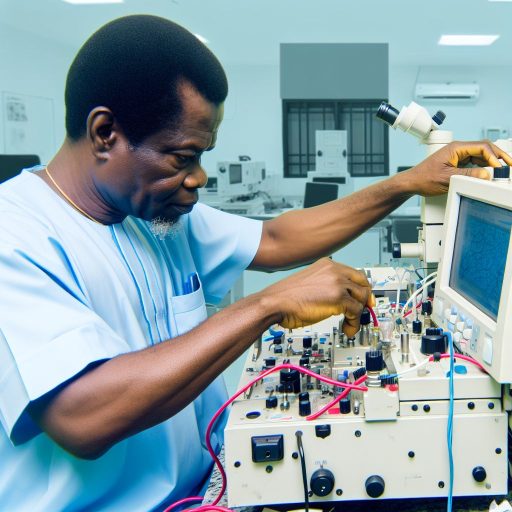Biomedical technology is the application of engineering and technology principles to the field of medicine.
It involves the design and development of equipment and processes to diagnose, monitor, and treat diseases.
Importance of Biomedical Technology in Public Health
Biomedical technology plays a crucial role in improving public health by providing innovative solutions for diagnosis, treatment, and prevention of diseases.
It enables healthcare professionals to deliver better and more efficient care to patients.
Relevance of Discussing Biomedical Technology in the Nigerian Context
In Nigeria, where public health systems face numerous challenges such as limited resources and inadequate infrastructure, discussing biomedical technology becomes particularly important.
It offers opportunities to bridge the gap and improve healthcare delivery in the country.
Overview of Public Health in Nigeria
Public health in Nigeria faces numerous challenges that require urgent attention.
The country’s healthcare system is burdened with a high disease burden, inadequate healthcare infrastructure, and limited access to essential healthcare services.
Highlight Major Public Health Challenges in Nigeria
- Infectious diseases such as malaria, HIV/AIDS, tuberculosis, and cholera remain significant public health challenges in Nigeria.
- Lack of access to clean water and proper sanitation facilities contributes to the spread of waterborne diseases.
- Inadequate healthcare infrastructure and a healthcare workforce shortage hinder the delivery of quality healthcare services.
- Poor health financing and lack of health insurance coverage limit access to healthcare for many Nigerians.
Discuss the Role of Technology in Addressing Public Health Issues
Biomedical technology plays a crucial role in addressing public health challenges in Nigeria.
It has the potential to revolutionize healthcare delivery by improving disease surveillance, diagnosis, treatment, and prevention.
- Telemedicine and mobile health technologies can help reach underserved populations in remote areas and improve access to healthcare services.
- Electronic health records (EHRs) can enhance patient care coordination, reduce medical errors, and improve healthcare outcomes.
- Digital health tools like health apps and wearables can empower individuals to monitor their health and make informed decisions about their well-being.
- Biomedical research and innovation can lead to the development of new diagnostics, vaccines, and treatments for various diseases.
Provide Statistics on Public Health Indicators in Nigeria
- According to the World Health Organization (WHO), Nigeria has one of the highest maternal mortality rates in the world, with 814 pregnancy-related deaths per 100,000 live births.
- The country also has a high infant mortality rate, with 67 deaths per 1,000 live births, and an under-5 mortality rate of 104 deaths per 1,000 live births.
- Nigeria struggles with a high burden of communicable diseases, with malaria accounting for 25% of deaths among children under 5 years old.
- Only 4 out of every 10 children in Nigeria are fully immunized against preventable diseases such as measles, polio, and yellow fever.
Improving public health outcomes in Nigeria requires a multi-sectoral approach that leverages the power of biomedical technology.
By investing in healthcare infrastructure, promoting health education, and adopting innovative technological solutions, Nigeria can enhance the well-being of its population.
It can also achieve sustainable development goals in healthcare.
Current State of Biomedical Technology in Nigeria
Nigeria, like many other developing countries, has seen significant advancements in the field of biomedical technology over the years.
These advancements have greatly impacted the healthcare sector in the country.
They have improved patient care and outcomes significantly.
From the use of advanced medical devices to the implementation of innovative treatment methods, biomedical technology has revolutionized healthcare delivery in Nigeria.
Use of Biomedical Technology in Healthcare Facilities
Healthcare facilities in Nigeria have increasingly adopted biomedical technology to enhance their services.
From hospitals to clinics, various medical devices and equipment powered by advanced technology are being utilized to diagnose, treat, and monitor patients.
For example, diagnostic tools such as MRI machines, X-ray machines, and ultrasound machines have become essential in the accurate diagnosis of illnesses and injuries.
Therapeutic equipment like dialysis machines and ventilators have also improved patient care and saved lives.
Challenges Faced in the Implementation of Biomedical Technology
Despite the numerous benefits of biomedical technology, its implementation in Nigeria comes with several challenges.
One major challenge is the high cost of acquiring and maintaining these advanced medical devices.
Many healthcare facilities in the country struggle to afford such equipment, leading to limited access to cutting-edge healthcare services.
Another challenge is the lack of adequate training for healthcare professionals on how to effectively use these technologies, which can hinder their optimal utilization.
Notable Advancements in Biomedical Technology in Nigeria
Despite the challenges, Nigeria has made remarkable advancements in biomedical technology.
For instance, telemedicine has gained popularity in the country.
This allows patients in remote areas to consult with healthcare providers through virtual platforms.
Such advancements have improved access to medical care for underserved populations.
Additionally, the development of locally made medical devices and equipment has helped reduce the reliance on imported technology.
This has made healthcare more sustainable and cost-effective.
Delve into the Subject: Restorative Dentistry vs. Cosmetic Dentistry
Biomedical Technology’s Role in Public Health in Nigeria
Biomedical technology plays a crucial role in improving public health in Nigeria.
It revolutionizes healthcare delivery throughout the country.
Enhancing Healthcare Delivery
Biomedical technology has significantly improved healthcare delivery in Nigeria.
It provides healthcare professionals with advanced tools and techniques for diagnosis, treatment, and monitoring of various medical conditions.
Diagnostic Capabilities
One of the key impacts of biomedical technology on public health in Nigeria is seen in the field of diagnostics.
Advanced imaging technologies such as CT scans, MRI, and ultrasound have made it possible to accurately diagnose diseases.
These technologies help treat diseases at an early stage, which improves patient outcomes.
Treatment Innovations
Biomedical technology has led to breakthroughs in treatment options for various medical conditions.
Transform Your Career with Expert Guidance
Get personalized mentorship consulting that’s tailored to your unique path. Our expert advice is actionable and exclusive.
Get StartedThe use of robotic surgery and minimally invasive procedures has made surgeries safer and more effective.
Additionally, advancements in pharmaceuticals have resulted in targeted therapies for conditions like cancer.
Significant Impact Cases
Several cases in Nigeria highlight the significant impact of biomedical technology on public health.
The use of telemedicine has allowed patients in remote areas to access healthcare services from specialists.
This has improved patient outcomes and reduced the burden on the healthcare system.
Addressing Public Health Challenges
Biomedical technology has the potential to address many public health challenges in Nigeria.
This includes infectious diseases, maternal and child health, and non-communicable diseases.
For instance, the use of medical devices for monitoring vital signs has helped in early detection.
Moreover, mobile health apps have aided in the management of diseases like hypertension.
Future Potential
The future of biomedical technology in Nigeria looks promising.
Ongoing advancements in areas such as artificial intelligence, genomics, and personalized medicine are expected.
These developments have the potential to revolutionize healthcare delivery further.
They can offer tailored treatments based on an individual’s genetic makeup.
Biomedical technology has made a significant impact on public health in Nigeria.
Its advancements enhance healthcare delivery and improve diagnostic capabilities.
Innovative treatment options address public health challenges effectively.
As investment continues in this field, Europe can look forward to remarkable health outcomes for its population.
Uncover the Details: Government Policies on Biomedical Technology Nigeria
Government Initiatives and Policies on Biomedical Technology
The Nigerian government has implemented various programs and policies to support the development and utilization of biomedical technology in the country.
Government Programs and Policies
Various programs and policies have been established to promote biomedical technology.
Areas Requiring Government Intervention
One area where government intervention is crucial is in funding research and development in biomedical technology.
Without adequate funding, progress in this field will be limited.
Collaborations with the Private Sector
The government has fostered collaborations with the private sector to advance biomedical technology.
These partnerships have led to the establishment of joint research projects and the sharing of resources and expertise.
Importance of Government Support
Government support is essential for the growth of biomedical technology in Nigeria.
By investing in research, infrastructure, and education, the government can help to promote innovation in this critical field.
Regulatory Framework
The government plays a key role in establishing a regulatory framework to ensure the safety and efficacy of biomedical technologies.
Regulations help to protect consumers and promote ethical standards in the industry.
Training and Capacity Building
Government programs focused on training and capacity building are essential for developing a skilled workforce in biomedical technology.
By investing in education and training, the government can help to build a strong foundation for the industry.
Funding Opportunities
Government initiatives that provide funding opportunities for biomedical technology projects are crucial for driving innovation and research.
By offering grants and subsidies, the government can incentivize companies and researchers to pursue new advancements in the field.
Public-Private Partnerships
Collaborations between the government and the private sector are vital for advancing biomedical technology in Nigeria.
By working together, these entities can leverage their respective strengths and resources to drive progress in the industry.
Promoting Access to Technology
Government policies that promote access to biomedical technology are essential for ensuring that the benefits of these advancements reach all segments of the population.
By reducing barriers to access, the government can help to improve public health outcomes in Nigeria.
Conclusion on Government’s Role in Biomedical Technology
Government initiatives and policies play a crucial role in promoting the development and utilization of biomedical technology in Nigeria.
By supporting research, fostering collaborations, and establishing regulatory frameworks, the government can help to drive progress and innovation in this critical field.
Explore Further: Blood Transfusion FAQs for Nigerian Patients

Importance of Research and Innovation
Research and innovation are essential for improving biomedical technology in Nigeria.
They help to drive scientific discoveries, improve healthcare outcomes, and address public health challenges.
Research Institutions and Organizations
In Nigeria, there are several research institutions and organizations working on biomedical technology.
- Nigerian Institute of Medical Research (NIMR): NIMR is a leading research institute focused on advancing biomedical technology in Nigeria.
- National Agency for Science and Engineering Infrastructure (NASENI): NASENI is involved in conducting research and development in various fields, including biomedical technology.
Innovative Solutions in Biomedical Technology
There are many innovative solutions being developed in the field of biomedical technology in Nigeria.
- Low-cost medical devices: Researchers in Nigeria are developing affordable medical devices to improve healthcare access in underserved communities.
- Mobile health technologies: Mobile apps and telemedicine platforms are being used to enhance healthcare delivery and patient care.
- Biomedical imaging technologies: Advanced imaging technologies are being developed to aid in the diagnosis and treatment of diseases.
Research and innovation are critical for advancing biomedical technology in Nigeria.
With continued investments in research and collaboration between institutions, Nigeria can make significant strides in improving healthcare and public health outcomes.
Uncover the Details: Impact of Restorative Dentistry on Overall Health
Enhancing Public Health Through Biomedical Technology
Biomedical technology plays a crucial role in enhancing public health in Nigeria by providing innovative solutions.
From medical imaging to telemedicine, these advancements are instrumental in improving healthcare outcomes.
Investing in biomedical technology initiatives is essential for addressing the healthcare challenges faced in Nigeria.
By supporting these initiatives, stakeholders can contribute to enhancing healthcare delivery and patient outcomes.
The integration of biomedical technology in the healthcare system is vital for achieving sustainable public health in Nigeria.
Additional Resources
Adegbite, Ayodeji – Department of History – UW–Madison
A health technology assessment of COVID-19 vaccination for …




